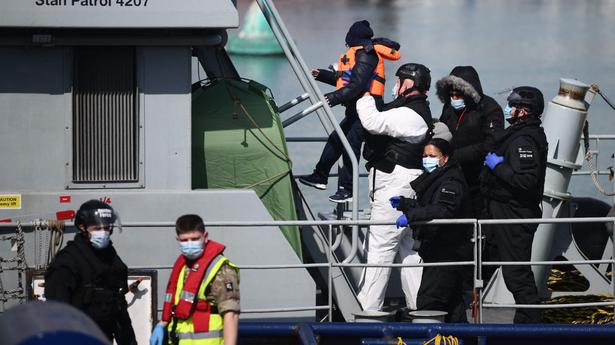
Explained | The U.K.’s plan to relocate asylum seekers to Rwanda
The Hindu
Britain’s Home Secretary Priti Patel was in Rwanda on April 14 to sign a deal to fly some asylum seekers to the East African country
The story so far: British Home Secretary Priti Patel visited Kigali, the capital of Rwanda, on Thursday, April 14, to sign what both countries have described as an “economic development partnership”, which will bring in force an arrangement to send asylum seekers “unofficially” arriving in the U.K. through the English Channel to Rwanda. The deal has attracted criticism from refugee organisations and the Opposition.
In a speech on Thursday morning, from the coast of the Channel in southeastern England, U.K. Prime Minister Boris Johnson announced, “From today….anyone entering the U.K. illegally as well as those who have arrived illegally since January 1, may now be relocated to Rwanda.” He described the move as an “innovative approach” fueled by his country’s “humanitarian impulse and made possible by Brexit freedoms”.
Under the “economic development partnership”, asylum seekers who board trucks and small boats or dinghies from France to cross the English Channel and arrive in Britain will be flown 6,500 km away to Rwanda, which will handle the processing of their asylum claims.
Ms. Patel, who signed the deal in Kigali on April 14 in the presence of the Rwandan Foreign Minister Vincent Biruta, put out a video on Twitter calling the deal a “world-leading migration partnership” that can see those arriving “illegally to the U.K. by dangerous methods” relocated to Rwanda to have their claims for asylum considered; and if granted refugee status, “to build their lives there”.
Mr. Johnson’s government said on April 15 that relocation of such individuals arriving in the U.K. could be seen happening within weeks. The deal would be active for five years on a pilot basis.
At the time of signing the deal, Ms. Patel stated: “those who are resettled (in Rwanda) will be given the support, including upto five years of training with help of integration, accommodation, so that they can resettle and thrive.”
Mr. Biruta said the agreement “is about ensuring that people are protected, respected, and empowered to further their own ambitions and settle permanently in Rwanda if they choose.”





















 Run 3 Space | Play Space Running Game
Run 3 Space | Play Space Running Game Traffic Jam 3D | Online Racing Game
Traffic Jam 3D | Online Racing Game Duck Hunt | Play Old Classic Game
Duck Hunt | Play Old Classic Game











